J-WAFS: Supporting food and water research across MIT

```html
A Decade of Impact: How J-WAFS Transformed Water and Food Research at MIT
Catalyzing Innovation: From Seed Funding to Commercialization
MIT's Abdul Latif Jameel Water and Food Systems Lab (J-WAFS) has revolutionized water and food research, injecting a dynamic energy into faculty engagement and sparking groundbreaking innovation. Through a strategic blend of philanthropic, corporate, and government support, J-WAFS nurtures research throughout its lifecycle, from initial seed grants to commercialization funding for mature projects.
With approximately $25 million invested directly into research over the past ten years, J-WAFS has become a vital resource for MIT faculty. "Since awarding our first cohort of seed grants in 2015, it's remarkable to see that over 10 percent of the MIT faculty have benefited from J-WAFS funding," observes J-WAFS Executive Director Renee J. Robins '83. "Many of these professors hadn't worked on water or food challenges before their first J-WAFS grant."
Empowering Faculty: Embracing Bold Ideas and Interdisciplinary Collaboration
J-WAFS fosters a culture of exploration, encouraging faculty to tackle critical water and food system challenges through open calls for proposals. Professor Patrick Doyle's journey into water purification exemplifies this transformative power. "Without J-WAFS, I would have never ventured into this field," Doyle reflects. Inspired by J-WAFS-funded colleagues, he successfully applied his expertise in soft materials to water purification, demonstrating the ripple effect of the J-WAFS community.
Similarly, Professor Otto Cordero of CEE credits J-WAFS for enabling him to pivot his research towards aquaculture. "My first J-WAFS seed grant has been extremely influential," Cordero states. "It allowed me to take a leap in a new direction." The grant empowered him to connect his expertise in microbial communities to the health of aquatic organisms, opening up exciting new avenues of research.
Nurturing Early-Career Researchers: Launching Trajectories of Impact
J-WAFS has played a pivotal role in shaping the careers of numerous assistant professors at MIT. By providing early support and encouraging exploration, J-WAFS has often provided their first MIT research grant, laying the foundation for future success.
Professor Ariel Furst highlights the profound impact of J-WAFS’ investment on her research. "This grant has truly shaped the development of my group's research program," Furst explains. J-WAFS backing enabled breakthroughs in water remediation and detection technologies, expanding the potential of her initial work.
Karthish Manthiram, now at Caltech, recalls how J-WAFS's early belief in his ambitious research on ammonia synthesis proved crucial. "J-WAFS took a big risk on us," Manthiram acknowledges. That initial support paved the way for breakthroughs that later secured significant NSF funding, showcasing J-WAFS's role as a catalyst for groundbreaking research.
Fueling Follow-On Funding: Amplifying Impact Beyond Seed Grants
J-WAFS seed grants serve as a springboard for larger-scale initiatives. J-WAFS Director John H. Lienhard V notes, “It’s often hard to get funding for early-stage or out-of-the-box ideas. J-WAFS-funded research projects have brought more than $21 million in subsequent awards to MIT.” This demonstrates the program’s effectiveness in attracting further investment and expanding the reach of its initial funding.
Professor Retsef Levi's experience exemplifies this ripple effect. His J-WAFS-funded study on agricultural supply chains led to a multi-million dollar follow-on initiative. The seed grant provided the crucial credibility needed to secure subsequent funding from other agencies, showcasing the leveraging power of J-WAFS support.
Fostering Global Collaboration: Addressing Challenges Worldwide
J-WAFS empowers MIT faculty to engage in impactful global research, fostering collaborations that transcend geographical boundaries and advance cross-cultural understanding. Professor Matthew Shoulders's inaugural J-WAFS Grand Challenge project to improve photosynthetic efficiency highlights this global reach, connecting MIT researchers with experts at the Australian National University.
Bridging Industry and Academia: Transforming Research into Real-World Solutions
Through its Research Affiliate Program, J-WAFS connects faculty with industry partners, facilitating collaborations that translate scientific discoveries into commercially viable products. Professor Alex Slocum’s partnership with Xylem on energy-efficient pumps demonstrates this successful model, resulting in a prototype and related IP now under development for commercialization.
A Future of Innovation: Continuing a Legacy of Impact
J-WAFS has created a thriving ecosystem of innovation, fostering interdisciplinary and international partnerships, and driving the commercialization of technologies with real-world applications. Looking ahead, J-WAFS remains committed to empowering MIT faculty to address critical global challenges in water and food security, building upon a decade of remarkable achievement.